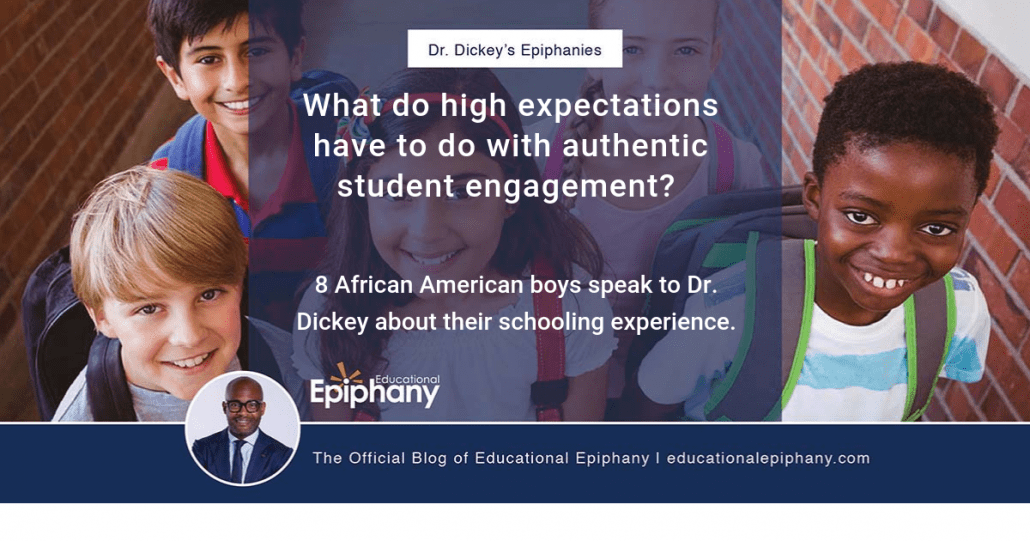School is one of the most influential systems in a child’s ecology and it is that ecology that almost irrevocably shapes a child’s subsequent disposition toward learning and the pursuit of new knowledge. So imagine a child eager to explore, willing to take risks, enthusiastic about engaging his/her peers, and earnestly willing to respond to prompts from teachers, whose schooling experience is constructed day after day, year after year by adults who have made a series uninformed judgments and decisions about his/her intellectual capacity based on race, ethnicity, gender, socio-economic status, family structure, or the zip code in which the neighborhood school resides.
Not one conscientious educator or policy maker reading this post would allow their offspring to be knowingly subjected to adults who would, even in the slightest, underserve their child for any of the aforementioned reasons. Yet every day, in America, children are met as they step off the school bus onto campus, as they enter the schoolhouse, as they open their lockers, and as they enter their classrooms by adults who harbor low expectations for the same children whom they have taken a pledge to serve to the best of their ability.
And you know what?
Many of our children can sense the low expectations that adults have of them. They often know and can sometimes articulate how adults with low expectations make them feel, but are we listening? Equally disconcerting is the fact that many of our children do not have a mechanism for processing or confronting the intangible, low expectations to which they are subjected frequently. So as a result, they turn inward, they disengage, they fail to be available emotionally to receive the education that they deserve and inadvertently their subsequent behavior reinforces the stereotypes projected upon them by the adults who should have known better than to judge children by their covers.
My scholarly research and experience as a teacher and school administrator (at the elementary, middle, and high school level) has shown me, without fail, that outside of expert-level knowledge of the content and effective delivery of instruction, the greatest catalysts of improvements in academic outcomes is a student-teacher relationship characterized by care, mutual respect, and high expectations. After all, the unit of change for student achievement and school improvement is not central office; it’s not a new textbook or basal; and it’s not even a new set of state-wide curricular standards. The unit of change for student achievement and school improvement is the classroom.
Wanting to better understand the impact of student-teacher relationships and teacher expectations on student achievement, I extensively interviewed eight African American middle school boys in a high-poverty, urban middle school in the Northeast. Each pupil reported the existence of a strong relationship between respectful interactions, high expectations, and their demonstrated ability to achieve academically. Without reluctance, the boys explicitly stated that it was their teachers who had the greatest effect on their desire and subsequent ability to achieve academically. Anthony and Andrew were specific about how their teachers motivated them to achieve academically. They described the motivating force as teachers’ concern for them as students. Anthony stated,
“The teachers care about your learning. They want you to get it. I know the teachers and they know me. They make me pay attention. They get on me [when I don’t]. They tell me to stay focused and pay attention.”
Andrew argued vehemently, “They give you a chance to do better…to hand in your work even if you are absent. They care. They make sure that you know what you need to know and need to have in your head. And even if the work is hard, they tell you that you can do it if you try.”
When asked to identify and discuss that which has the greatest influence on his desire to achieve, Earnest said without hesitation, “It’s the teachers. They make you want to learn.” Harold responded similarly, “The teachers make me want to achieve. They care about your attendance.” When asked how the adults in their classrooms regarded them, the boys overwhelmingly described their teachers’ treatment of them with one phrase—“With respect.” The boys also argued that the respect they are shown held them accountable for their behaviors and academic performance and subsequently required them to interact with the teachers in a comparable fashion.
Anthony said, “The teachers treat me with respect. That makes me want to allow them to teach what they have to teach. The respect that they show me requires me to do their work. It makes me want to hear what they have to say and teach. If I ruin the respectful relationship, the teacher will care less.”
On the same accord, Keith said, “The teachers treat me with respect. If I am doing something wrong, they tell me. Then I will straighten up. They take me to the side to correct me. They don’t put me on the spot to embarrass me. That helps me to get back on track and keep on learning. It makes me want to show respect back by learning and not talking or interrupting.”
Charles agreed saying, “The teachers are respectful. They don’t say bad stuff to me. They tell me ‘good job’ when I do well and if I am acting up, they correct me, which makes me want to learn from my mistakes and do well in school.”
Daniel offered this quote to explain how a caring, respectful, teacher with high expectations translates into willingness to learn, “They treat me with respect and fairness… no difference in how boys and girls are treated. Since they don’t take sides, I can learn from them and participate in class.” When describing how his relationships with teachers influence his desire to achieve academically, Harold said, “They are nice and welcoming. They say good morning and good to see you. They even hug you. And because I look up to them, that makes me want to come to school every day and learn more.”
Earnest responded similarly, saying, “They treat me well and it impacts my grades because they treat me so well that it makes me want to achieve.” Lastly, Andrew stated, “The teachers have manners. They don’t do bad things to students. When they [the teachers] treat you well and believe in you, it makes you think that you can do well on a test.”
So here is the epiphany.
In short, the middle school boys with whom I spoke, overwhelmingly linked student-teacher relationships and high teacher expectations to their willingness and capacity to achieve academically. They reported that because teachers were caring, respectful and believed in their intellectual capacity to achieve, it became incumbent upon them to: (a) respond in-kind by engaging in instruction authentically; (b) refrain from engaging in disruptive behaviors; and (c) demonstrate the acquisition of new knowledge and skills whether through classwork, homework, or performance on quizzes and tests.
The boys also regarded the constant reminders to focus and remain focused as useful and reflective of their teachers’ concern for their wellbeing. Equally significant is the notion suggested by the boys that their teachers’ high classroom expectations transferred to expectations in non-classroom settings reinforcing the importance of exercising executive functioning to maximize access to instructional time. Lastly, the boys described a link between the quality and rigor of classwork and homework and high teacher expectations. The boys purported that their classwork and homework assignments supported their abilities to perform academically, think critically, and problem solve as opposed to regurgitate information in the same form it was presented by the teacher. They believed that access to this level of instruction was directly connected to their teachers’ belief in their intellectual capacity to do the work, which fueled their engagement and drive to achieve.
For more on my research on the link between high expectations and student achievement, read chapter 1 of The Integrated Approach to Student Achievement – Second Edition. It is available exclusively on our website – www.educationalepiphany.com.
Donyall D. Dickey, Ed.D.

